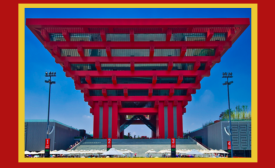china
David Stern is set to retire in February 2014, after completing exactly 30 years of service as commissioner of the National Basketball Association (NBA). In transforming the NBA from a drug-addled public-relations nightmare of a league into a multi-billion dollar entity, Stern’s proudest accomplishment is growing the game globally. After investing in Europe for the better part of a decade following the fall of communism in the Eastern Bloc countries, Stern set his sights on Asia as a new frontier.
A picture spoke volumes about the United States' loss of global prestige and influence due to the shutdown of its government in a partisan standoff over the federal budget and debt. Chinese President Xi Jinping and Russian President Vladimir Putin beamed front and centre in the family photograph of Asian leaders at last week's Asia-Pacific Economic Cooperation (APEC) summit in Bali.
A top Chinese official secretly visited Japan earlier this month to hold talks with senior Japanese counterparts over how best to address simmering tensions over the Senkaku Islands in the East China Sea, Chinese government sources said Tuesday.
The increased tempo of Beijing’s public diplomacy activities in recent years, from Confucius Institutes to the 2010 Shanghai World Expo, have received poor to mediocre reviews internationally. Expensive projects have been received positively by the Chinese public, but have done little to reverse China’s continued international image problems. Although a narrative of crisis pervades international scholarship on Chinese public diplomacy, there appears little evidence to suggest that Beijing is concerned.

The increased tempo of Beijing’s public diplomacy activities in recent years, from Confucius Institutes to the 2010 Shanghai World Expo, have received poor to mediocre reviews internationally. Expensive projects have been received positively by the Chinese public, but have done little to reverse China’s continued international image problems. Although a narrative of crisis pervades international scholarship on Chinese public diplomacy, there appears little evidence to suggest that Beijing is concerned.
Some commentators have criticized China's State-led efforts to strengthen the country's "soft power." Joseph Nye, to whom the soft power concept is credited, observed that the China just "doesn't get soft power." Big state-funded initiatives, such as the global roll-out of Confucius Institutes and investments in CCTV and Xinhua, have headlined China's culture-heavy public relations drive.
After declaring the nation “open for business,” Australian Prime Minister Tony Abbott has set a target of achieving free trade deals with China, Japan and South Korea within just 12 months. Can the recently elected leader succeed where his predecessors failed? Having stated at the APEC summit in Bali that he wished to swiftly conclude eight years of negotiations with China, Abbott told reporters at last week’s East Asian Summit in Brunei that he was adding the nation’s second and third-biggest trading partners to the target list.
In contrast to neighboring countries, former U.S. National Intelligence Director Dennis Blair welcomes the efforts by Prime Minister Shinzo Abe to reinterpret the pacifist Constitution and bolster the nation’s defense capabilities, saying Japan needs to adapt itself to the changing security landscape of the Asia-Pacific region.







